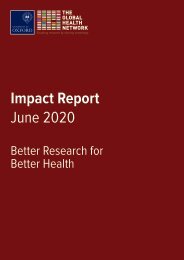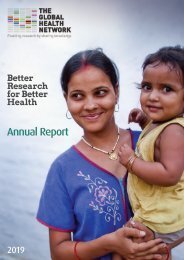ARCH Stakeholder Mapping Report
Create successful ePaper yourself
Turn your PDF publications into a flip-book with our unique Google optimized e-Paper software.
8 In some contexts, research work is not of high standard, especially during pandemics. Consequently, most<br />
institutions look up to developed countries for interventions because the perception is that their initiatives are<br />
better.<br />
9 Knowledge generation, including publication of findings is more emphasized than the use of knowledge generated.<br />
10 It is unclear who guides or influences what work or topic is relevant.<br />
<strong>Stakeholder</strong> snowballing and stakeholder analysis (power interest)<br />
For the workshops and the survey, participants identified stakeholders and the contexts in which they work in, the<br />
health areas they work in, and how they interact with research uptake. These stakeholders have been showcased on<br />
the ‘regions page’ of the <strong>ARCH</strong> hub (https://arch.tghn.org/regions/).<br />
Following the stakeholder snowballing, participants categorised stakeholders they mentioned and other stakeholder<br />
categories according to the power-interest matrix. Because the stakeholder mapping process was continuous, regional<br />
coordinators for the <strong>ARCH</strong> programme supplemented the list of identified stakeholders within their networks and<br />
regions.<br />
Through these snowballing activities, we identified 56, 69, 16, and 24 stakeholders for Africa, Latin America, Asia, and<br />
Global respectively.<br />
3. Discussion and Key Takeaways<br />
Participants recognised the revolving nature of the research uptake cycle and the different stakeholders involved. They<br />
concurred that while most research is performed with rigor and integrity and results end up in good publications, what<br />
happens after that is not prioritised. They also agreed how policies and practices should feedback into the research<br />
cycle in generating new research questions, therefore completing the research cycle.<br />
It was also stressed the importance of thinking about research uptake during particular moments throughout the<br />
research cycle. Advocacy of research uptake should be done from the very beginning and at all spatial levels, such as local,<br />
provincial, and federal. Researchers also need to increase their confidence, to plan and conduct research tailored to<br />
taking up the findings or recommendations into policy and practice.<br />
Participants from Asia argued that stakeholders may be able to influence an activity because of other circumstances<br />
such as having a link to an institution or individual who can provide them that power. Participants also highlighted that<br />
the categorisation of stakeholders in this manner is not a static or permanent approach. Levels of power or interest are<br />
constantly changing among stakeholders. Additionally, power and interest levels among stakeholders depend on specific<br />
health issues in question. Like the Asia workshop, participants in the Africa workshop argued that stakeholders,<br />
especially the community, may change their position across the power-interest matrix. Also, they mentioned that some<br />
stakeholder’s interest can be provoked. Such is for example the case of the parliament, who in general has power, but<br />
their interest needs to be “provoked” through engagement. The parliamentarians may not understand the importance<br />
of evidence, but this can be changed or created through policy engagement.<br />
Further, it was emphasised by the participants that communities 3 are usually not involved in research process, and<br />
especially in the formulation of research proposals, which then in return makes it hard for them to understand how<br />
research results and resulting action (policies) impact their life. As such, research needs to be brought to communities<br />
3<br />
Referred here by participants as group that benefits from research, such as health personnel, local governments, or non-profit<br />
organisations, etc.<br />
7





